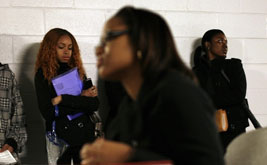National Confrontation on Race National Confrontation on Race
At the end of a long painful week, Shirley Sherrod's been offered a new job with the USDA's Office of Civil Rights and Community Outreach. She's still considering, though, and who can blame her? In an interview on Good Morning America Sherrod said Thursday that she wasn't ready to accept Agriculture Secretary Tom Vilsack's job offer. She said she wanted to hear more from the Secretary and his boss. She wants to know that the President is "fully behind" her." "I would hope that he is..." she said. "I would love to talk to him." And that's where we're at. Yesterday in our studio, Harry Belafonte noted that we don't have a national conversation about race, we have a confrontation. People from different races still don't know one another. As he put it, in an interview with ColorLines: "The person from whom you're thinking of taking life, or land, have you heard their story, have you sung their song?" While the race- like the red-baiting by the Right- is the most obvious crime in the Sherrod story, the question of who believes whom and why, comes next. It may even be a bigger problem -- after all, it's only because of misplaced trust -- that the baiting works. Tom Vilsack, in his apology to Sherrod Wednesday, said he didn't think before calling for resignation. But that's not quite true. He did think. And he chose to believe the baiters first. That's the first problem. Why did they, not she, win his first gut-level confidence? Melissa Harris-Lacewell pointed out on MSNBC Wednesday night, had Vilsack known Sherrod's history better -- he'd have known that her father was shot in the back by a white farmer when she was 17; that she had history with the civil rights movement. That her husband worked with the Student Non-Violent Coordinating Committee and he'd have known of her involvement with a lawsuit, recently settled, representing black farmers, long dispossessed as part of the post-Reconstruction backlash against emancipated blacks. If he'd understood those things, if they'd resonated -- he'd have known they made her a perfect target. If he'd known that -- and felt it -- there's a chance that even at the gut-level, he'd have heard an echo of past, similar fabrications -- not a fact. Indeed, if the entire USDA heard and felt that history, they'd not have dragged their mostly-white feet so long in getting black farmers justice. Eric Holder was right. We're still a nation of cowards on the issue of race. But here's another opportunity to grapple with it. We don't need a debate over whether we're post-racial -- clearly that's settled. As is the matter of whether the Fox News Channel is a journalistic project. What we need now is what Sherrod's asking for from the president -- time to talk. We need true conversation, that starts with learning one another's histories. Not the whitewashed sort that Texas and Arizona textbooks want to teach, but our real histories - and why they matter. It's not just a question for the President. It's for all of us. Do we as a nation have Sherrod's back?
Jul 23, 2010 / Laura Flanders
There’s a Beautiful Story Hidden in the Sherrod Mess There’s a Beautiful Story Hidden in the Sherrod Mess
Nation columnist, Melissa Harris-Lacewell is angry with the administration, the NAACP, and blogger Andrew Breitbart, but maybe some good can come out of all of this.
Jul 22, 2010 / Morning Joe
Lies and the Vilification of Black Women Lies and the Vilification of Black Women
America has a long history of turning black women into scapegoats.
Jul 22, 2010 / Countdown
Rolling Over on Shirley Sherrod Rolling Over on Shirley Sherrod
How many times is the Obama administration going to roll over for Glenn Beck?
Jul 21, 2010 / Laura Flanders
Charges in Police Killings Just a Start Charges in Police Killings Just a Start
If a federal investigation's good enough for New Orleans, how about Oakland too?
Jul 14, 2010 / Laura Flanders

An Unequal-Opportunity Recession An Unequal-Opportunity Recession
The distribution of damage done by the Great Recession is not equal. African-Americans, men and low-skilled workers have been hardest hit.
Jun 30, 2010 / Feature / Katherine S. Newman and David Pedulla

For African-Americans, A Virtual Depression—Why? For African-Americans, A Virtual Depression—Why?
Black and white Americans still don't live near each other. Does that account for persistent economic inequality?
Jun 30, 2010 / Feature / Orlando Patterson
Ghosting History Ghosting History
Heidi Durrow traces a young girl's harrowing plunge into racial identity.
Jun 30, 2010 / Books & the Arts / Madison Smartt Bell
You’ve Got to Be Carefully Taught You’ve Got to Be Carefully Taught
Despite conservative attempts to whitewash what they learn in school, young Americans are a diverse and tolerant bunch—and they know it.
Jun 9, 2010 / Column / Melissa Harris-Perry
Arizona’s Agenda of Hate Arizona’s Agenda of Hate
Guest-hosting The Rachel Maddow Show, Nation DC Editor Chris Hayes speaks with Arizona Representative Raúl Grijalva about the ongoing assault on civil liberties in his stat...
May 24, 2010 / Press Room
